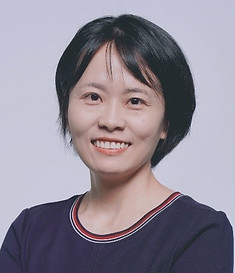Martina Holenko Dlab
University of Rijeka, Faculty of Informatics and Digital Technologies
C4: ICCE Sub-Conference on Technology Enhanced Learning for Mobility of Learners and Learning Experiences (TEML)
Aligning educational technology innovation with learning objectives through learner-centered design
Technologies offer new opportunities to address persistent challenges in education, particularly the need to motivate learners and support their active engagement in cognitively demanding learning processes. Approaches that integrate educational technologies such as artificial intelligence, gamification platforms, immersive environments and educational robotics are increasingly seen as promising ways to create more engaging and personalized learning experiences.
While the adoption of these technologies continues to grow, their impact on learning remains uncertain. Many learners actively engage with them, yet their effectiveness and efficiency are not consistently supported by research. In some cases, implementation occurs without clear alignment to specific learning objectives or pedagogical frameworks. This highlights the need to move beyond a technology-first approach. To fully realize the potential of these tools, their integration should be intentionally designed to support teaching and learning. This requires alignment with learning objectives, guidance
from sound pedagogical principles, and a foundation in effective learning design.

Dr. Martina Holenko Dlab is an Associate Professor and Head of the Chair of Multimedia Systems and E-Learning at the Faculty of Informatics and Digital Technologies, University of Rijeka, Croatia. Her research focuses on technology-enhanced learning, with particular interests in blended learning, computer-supported collaborative learning (CSCL), game-based learning, recommender systems, and the use of artificial intelligence in education. She has co-authored numerous scientific and professional papers in these fields. Her research is regularly presented at international conferences and contributes to the
advancement of digital education practices. She has extensive experience in designing, implementing, and evaluating technology-enhanced learning models, as well as in delivering teacher training through national and international projects.
Jie Chi Yang
National Central University, Taiwan
C5: ICCE Sub-Conference on Educational Gamification and Game-based Learning (EGG)
Unpacking the Impacts of Learner Differences through Digital Game-Based Learning
Digital Game-Based Learning (DGBL) has emerged as a powerful educational approach to enhance learners’ motivation and engagement. However, increasing
evidence indicates that diversities exist among learners’ reactions to DGBL, due to a range of individual differences. This talk synthesizes key findings from over a decade of empirical research examining how human factors, such as prior knowledge, gaming experience, gender, and anxiety levels, influence both learning outcomes and in-game behavior within DGBL. Drawing on empirical evidence from multiple studies, I will demonstrate how specific learner characteristics can affect the impacts of learning strategies within DGBL. Finally, this talk will highlight design solutions for DGBL with the ultimate goal of informing the development of inclusive learning environments that can accommodate a wide range of individual needs and preferences.
Dr. Jie Chi Yang is a Distinguished Professor in the Graduate Institute of Network Learning Technology at National Central University (NCU), Taiwan. He also currently serves as the Director of the Research Center for Science and Technology for
Learning at the NCU. Dr. Yang’s research interests include digital game-based learning, computer-assisted language learning, human factors, and interactive learning environments. He has published over 100 peer-reviewed journal articles and
conference papers, with the majority of his journal articles appearing in top-tier international journals. He has obtained substantial research funding from Taiwan’s National Science and Technology Council (NSTC) to support the development of
adaptive instructional strategies and game-based learning platforms. Dr. Yang has played key roles in organizing major international conferences. Notably, he served as the International Program Committee Coordination Chair for ICCE 2018. In
recognition of his contributions to the field, he acquired the Outstanding Research Award from the NSTC in 2019.

Yun Wen
Learning Sciences & Assessment (LSA) Department, National Institute of Education (NIE),
Nanyang Technological University (NTU), Singapore
C6: ICCE Sub-Conference on Technology Enhanced Language Learning (TELL)
Evolving Learner Agency: From AI Support to Learner-AI Shared in Second Language Learning
Recent advancements in generative artificial intelligence (GenAI) have led to significant transformations across educational contexts, with particularly profound
implications for language learning. For young second language learners, who are still developing cognitive, linguistic, and self-regulatory capacities, these changes call for the thoughtful and holistic design of GenAI-supported learning environments. This talk will draw on concrete cases to examine why learner agency is essential and how such agency is shaped, supported, or constrained in the AI-powered learning environment. This talk invites a rethinking of AI’s potential in second language learning contexts, provides insights into the design of AI-powered language learning environments, and highlights methodological considerations for investigating their effectiveness.

Wen Yun is an Assistant Professor in the Learning Sciences and Assessment Department at the National Institute of Education (NIE), Nanyang Technological University, Singapore (NTU). Her research investigates how people learn through interaction and dialogue in multimodal environments, and how emerging technologies, such as Augmented Reality (AR) and Artificial Intelligence (AI), can foster high-quality interactions to promote teaching and learning. She leads interdisciplinary teams to translate research into practical educational applications, developing impactful and sustainable technology-enhanced learning solutions. She was awarded the Social Science and Humanities Research Fellowship by the Singapore Social Science Research Council in 2022, and the first recipient from the NIE to receive the prestigious NTU Nanyang Research Award. She currently serves as an Associate Editor for Educational Technology & Society and the Asia Pacific Journal of Education.
